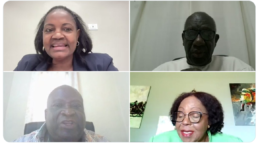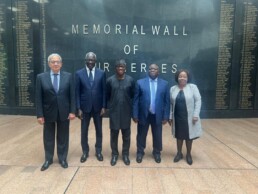Making the Panel of the wise fit for purpose critical for effectively delivering on AU’s preventive diplomacy role
Date | 9 May 2024
Solomon Ayele Dersso, PhD
Founding Director, Amani Africa
Previne Habu
Researcher, Amani Africa
While the Panel of the Wise is one of the pillars of the African Peace and Security Architecture (APSA) operational since 2007, both its effective functioning and the carving out of clear space in executing its role, primarily involving conflict prevention, remain a work in progress. This can be gathered, for example, from the recent briefing of the Panel to the 1204th session of the Peace and Security Council (PSC). The measures specified in the outcome of this session and their implementation are key for making the Panel a fit-for-purpose continental preventive diplomacy tool. At the same time, it is critical that the Panel is not encumbered with roles that spread it thin and undermine its effectiveness in its primary role of conflict prevention.

The reflections in the PSC session can be logically organised as focusing on not only the activities of the Panel but also it’s a) the Panel’s institutional interface with bodies with relevant mandates, b) institutional and operational arrangements, and c) its working methods. As the communique of the 1204th session indicates, on the institutional interface of the Panel with AU bodies with relevant mandates, the issues that the PSC deliberations covered include:
i. the Panel’s role in revitalising cooperation with similar mechanisms at the Regional Economic Communities and Regional Mechanisms (RECs/RMs) [i] and
ii. the operationalisation of the roles of the subsidiary mechanisms of the panel – FemWiseAfrica, PanWise and Network of African Youth (WiseYouth).
The deliberations and the communique also highlight the importance of coordination and ensuring synergy of efforts in conflict prevention as well as the need for creating platforms of meaningful participation of women and youth in preventive diplomacy, mediation and peacebuilding and the engagement and the signing of Framework of Cooperation with APR Panel of Eminent Persons. The PSC also encouraged the Panel to extend a similar relationship with the Banjul Commission, which is erroneously stated in the communique as the African Court instead of the African Commission on Human and Peoples’ Rights.
In terms of the institutional and operational arrangements of the functioning of the Panel, the activity report of the Panel highlighted the perennial challenges of provision of the requisite resources for the effective execution of its mandate. Indeed, apart from the composition and dynamism of the members of the Panel, the effective implementation of the Panel’s mandate depends on the secretarial and institutional support that the AU Commission puts at its disposal.
In this respect, the PSC reiterated its request for the AU Commission ‘to provide requisite resources, including political, human and financial resources, to enable the Panel to implement its mandate effectively in line with its modalities to ensure the timely prevention and resolution of conflicts in Africa.’ Additionally, the PSC also tasked the AU Commission to ‘facilitate rapid deployment mechanism for the Panel of the Wise to timely respond to emerging conflicts and crises.’ This is a major step forward in the evolution of the institutionalisation of the work of the Panel. It is worth recalling that despite the fact that the PSC Protocol envisages that the Panel meets as may be required for the performance of its mandate, the Panel is not a standing body. Accordingly, among others, facilitating a rapid deployment mechanism for the Panel necessitates that the Panel and its membership be organised to operate on a standby basis.
The other aspect of the functioning of the Panel that the session addressed concerns the working methods of the Panel. In this respect, the Communique of the session canvased issues of the Panel’s working methods as part of the key actionable decisions of the session. Thus, the PSC requested the AU Commission to:
i. facilitate the provision of mission reports of the Panel of the Wise to the Council;
ii. ensure the Panel of the Wise receives early warning information and analyses to enable the Panel to proactively deploy preventive diplomacy efforts;
iii. strategic reviews of the Panel of the Wise’s activities to evaluate the effectiveness of the Panel’s interventions, identify areas for improvement, and adjust strategies in alignment with the dynamic nature of conflict and crisis situations on the continent; and
iv. support and facilitate joint deployments of the Panel of the Wise with similar regional bodies, particularly in contexts requiring urgent attention, leveraging the collective expertise and resources for conflict prevention and management efforts.
One of the other key outcomes of the 1204th session was the call of the PSC for a follow-up and re-engagement plan by the Panel for maintaining sustained attention to countries that the Panel visited as part of its conflict prevention initiative. Additionally, the PSC requested the Panel to continue engaging stakeholders in countries where it undertook missions. Developing these working practices is key not only for following up on recommendations made by the Panel as pointed out by the PSC but also for monitoring developments in those countries, among others, in order to initiate follow-up engagement that the situation in those countries warrants.
As documented in the AU PSC Handbook, the Panel’s track record also shows that it has identified an effective mechanism for exercising its advisory role through its thematic reflections. As a strategy for building its preventive diplomacy role, it has also developed preventive missions to countries with potential risks of crises particularly in the context of elections. In this respect, it is also expected that the Panel will have another mission to South Sudan before the country’s general elections in December 2024. While these experiences provide guidance towards making the Panel fit for purpose, it should not lead to bulging the Panel’s role too wide.
As if the Panel’s mandate in conflict prevention is not itself onerous enough (and has yet to be fully and effectively implemented) and the Panel has the luxury of adding further work, the PSC encouraged it to support the implementation of peace agreements on the Continent and support mediation efforts of AU High-Level Panels in their respective areas of engagement. The PSC also further muddied the role of the Panel when it envisaged ‘the critical need to utilise the Panel’s extensive expertise and influence to accompany Mali, Gabon, Guinea, Burkina Faso, Niger and Sudan to return to constitutional order, as well as processes in South Sudan and Chad.’

Instead of the Panel, these transitions each require a standing mechanism that catalyses and facilitates the initiation and implementation of relevant reforms that would ground each on a solid path for not only achieving restoration of constitutional order but also avoiding the recurrence of unconstitutional changes of government. Thus viewed, the expansion of the work areas of the Panel envisaged in the outcome of the session will not advance the effectiveness of the Panel. If anything, it would reduce the Panel’s focus on its core areas of responsibilities relating to preventive diplomacy.
Both the deliberations and the outcome of the session reflect a continuing lack of clarity about the role of the Panel. While the Panel’s mandate covers preventive diplomacy and advisory roles, it seems that there is an expectation for it to expand its role to early warming, mediation, and provision of support to countries in transition. As an essentially technical process with its own protocols and modules for tracking and measuring as well as analysing various risk factors, the provision of briefings on country situations and horizon scanning briefings should be left to the Continental Early Warning System (CEWS) supported by CISSA and APRM which have early warning roles on account of their mandate and areas of work.

The best use of the role of the Panel – as per the mandate entrusted to it under the PSC Protocol and its standing as a preventive diplomacy instrument that engages in preventive or de-escalation action within the framework of APSA – would be for it to implement effective preventive diplomacy actions on the basis of a robust conflict prevention and preventive diplomacy strategy building on and as a follow up to the early warning provided by CEWS. Such a focused use of the Panel would not only provide clarity on the focus of the Panel’s mandate and areas of work but also avoid the risk of the Panel spreading thinly with little effectiveness. The most accurate formulation of the 1104th PSC session communique in this respect tasks the AU Commission to ensure that the Panel ‘receives early warning information and analyses to enable the Panel to proactively deploy preventive diplomacy efforts.’
_________________________________________________
[i] Reference is made to the structures similar to the Panel of the Wise established at the RECs/RMs levels notably the Economic Community of West African States (ECOWAS) Council of the Wise, the Economic Community of Central African States (ECCAS) Panel of Elders, the Common Market for Eastern and Southern Africa (COMESA) Committee of Elders, the Southern African Development Community (SADC) Panel of Elders and the Intergovernmental Authority on Development (IGAD) Mediation Reference Group.
The content of this article does not represent the views of Amani Africa and reflect only the personal views of the authors who contribute to ‘Ideas Indaba’